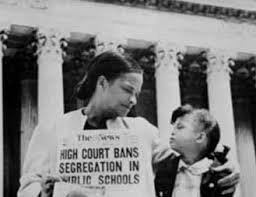 Center for Media and Democracy PR Watch
Center for Media and Democracy PR Watch
Are school vouchers really a “libertarian scheme cooked up out of an ideological hostility toward the idea of public schools” or a means to “subsidize and perpetuate segregation?” If you leave half the history out of the equation, you might reach that conclusion. This is what PR Watch, a left-wing group out to expose right-wing spin, ironically ends up achieving in a blog post on school vouchers.
Let’s not forget that desegregation efforts began because public schools were racially segregated for more than a century.
Following the landmark ruling in Brown v. Board of Education, a resistance movement to desegregation began. Some segregationists did find a solution in a short-lived form of private school vouchers. But many more resisted integration through public schools, sometimes by shutting them down (which also contributed to an increase in private school enrollment) or by zoning black students completely out of their districts.
 Some public school districts remain highly segregated to this day. Opponents of school choice sometimes forget that racial imbalances can occur between school districts, like in North Carolina or St. Louis (where a mostly white district recently tried to prevent mostly black students from transferring in).
Some public school districts remain highly segregated to this day. Opponents of school choice sometimes forget that racial imbalances can occur between school districts, like in North Carolina or St. Louis (where a mostly white district recently tried to prevent mostly black students from transferring in).
PR Watch brushes aside this history to de-legitimize the modern school choice movement’s focus on equity, civil rights and improving education quality for low-income and minority students.
The reality is that our entire education system has to confront a legacy of racism and segregation. The question is what to do about it. Giving all families alternatives to what was once an oppressive system of geographic school assignment can be part of the answer.
Grade: Needs Improvement
Oklahoma!
 A new bill signed by Gov. Mary Fallin will allow more Oklahoma public school districts to authorize new charter schools. Previously, charter schools were limited to the urban areas of Oklahoma City and Tulsa.
A new bill signed by Gov. Mary Fallin will allow more Oklahoma public school districts to authorize new charter schools. Previously, charter schools were limited to the urban areas of Oklahoma City and Tulsa.
Of course the districts are complaining they cannot afford to open up charter schools. But as Rep. Jason Nelson plainly pointed out to The Oklahoman, if they can’t afford to open a charter school, they don’t have to.
It’s great to have a choice.
Grade: Satisfactory
John Young

John Young, a freelance columnist, says vouchers are “flim flam.” He argues that vouchers are “deceitful at their core” and that “school vouchers aren’t really about education at all.”
His evidence is limited entirely to the fact that scholarship amounts are sometimes less than the cost of private school tuition. He takes this as proof that vouchers and tax-credit scholarships are really designed to serve higher-income families.
One problem with this argument: The proposal he criticizes in Texas would set clear income limits for eligible students.
Young would be better served by talking with actual low-income parents who have found a way to enroll their children in private schools thanks to voucher and tax credit scholarship programs. Sometimes the scholarships cover full tuition; sometimes they don’t. Hopefully, when they don’t, schools or other charitable organizations will step up to help parents close the gap.
Still, if parents decide they value their child’s education so much that they want to dig into their pockets to cover additional tuition beyond what their scholarships cover, shouldn’t we honor their commitment to their children’s education by giving them that option?


